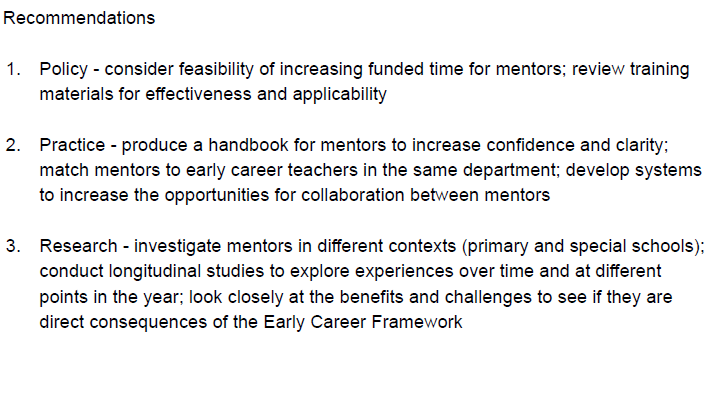A case study exploring experiences and perceptions of mentoring in the context of the Early Career Framework
- Interview
- Survey
- Mainstream
- Peer supervision
- Education and Language
In 2019, the Government published the Teacher Recruitment and Retention Strategy, which focused on trying to improve recruitment rates in the teaching profession whilst reducing the rising rates of qualified teachers leaving the profession. At the centre of this Strategy was the introduction of the Early Career Framework, a fully funded package of two-year support for new entrants to the profession that provided a suite of training materials and a subject mentor with funded time dedicated to undertaking the role of supporting the development of the early career teacher. Whilst there have been several studies published into the experiences of early career teachers since the introduction of the Framework, substantial research into the experiences of mentors has been lacking, limited to evaluative surveys or combined with studies into the experiences of other participants. Therefore, this small-scale case study explores the experiences of mentors in one secondary school in northwest England following the introduction of the Early Career Framework. Through a combination of questionnaires and semi-structured interviews, this study aims to investigate how the Early Career Framework has impacted mentors and the opportunities and challenges that have been created through the introduction of the Framework. The findings of this study suggest that, whilst the aims and intentions of the Early Career Framework are welcomed by mentors, the implementation and practical implications of the Framework present several significant challenges to the workload and wellbeing of mentors. In line with this study’s conclusions, the recommendations to policymakers focus on designing an effective and efficient programme that considers the concerns of mentors at the forefront. As well as this, this study recommends that school leaders consider how the implementation of the Framework in their setting may present significant challenges to mentors and use the mechanisms available to them within their setting to ameliorate these challenges.
The needs of this community are complex and exist on multiple levels. For some mentors, a need for clarity and consistency is their primary need; for others, a need for efficiency and effectiveness of their time is their most important. Communities are defined by their complexity, none more so than schools such as the ones which Teach First primarily serve. However, one need that permeates throughout the whole community of mentors is the need to feel as though the policy and practice changes introduced through the ECF are ‘making a difference’. The present time, after the ECF has been rolled out and in place for a number of years, marks a significant moment in the efficacy and longevity of the ECF. Therefore, one of the primary goals of the dissemination of this research is to ensure mentors continue to buy into the Framework and remain optimistic and enthusiastic about the ECF. The knowledge I have generated in this study has the potential to have salient impacts on the community of mentors. At a local level, the findings about clarity and support have the potential to drive organisational change and improve the culture of mentoring in my immediate school context. However, at a wider and more national level, the findings about apathy and lack of engagement with training providers and online content has the potential to drive significant change for the wider community of mentors. Further research should look to investigate the experiences and perceptions of mentors to the training they receive; motivated by the findings of this study, this further research has the potential to drive significant change and result in significant improvements for mentors on a more national scale.

